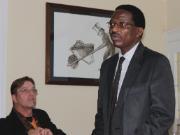
The Rhodes University Fine Art Department held a symposium last week (16-17 October 2014) titled Blind Spots and ways of not seeing. The aim of the symposium was to encourage younger scholars to write and start publishing.
Head of Fine Art Department, Prof Dominic Thorburn welcomed the newly elected Vice-Chancellor of Rhodes, Dr Sizwe Mabizela, to the symposium. Prof Thorburn told the audience that Dr Mabizela is from a Mathematics background, He quipped, mathematicians are “the creators within the sciences.”
Dr Mabizela commented on the destructive nature of the neo-liberals who construct the Humanities and the Arts as not worthy of study as opposed to the Sciences. He added that it was short-sighted to focus only on skills and profit because it “reduces our sympathy with the marginalised and jeopardises our hope of democracy.”
Dr Mabizela assured those in attendance that Rhodes University places a high premium on work done in the Fine Art Department.
“A symposium of this nature is vitally important. We need arts to create and sustain a decent society. We need arts to understand who we are and our place in the world,” added Dr Mabizela.
Prof Simbao, who herself is a writer both in the academic and arts worlds, believes that there is a paucity of good writing about the visual arts in South Africa. The problem is not only in the quality of writing.
“For me it’s also an issue of diversity of voice, diversity of knowledge, and diversity of the type of art that is written about and receives exposure,” said Prof Simbao.
Residencies for Artists and Writers-Eastern Cape (RAW-EC) is a new and innovative learning project funded by Lotto under the leadership of Professor Ruth Simbao.
The RAW—EC project consisted of two artists’ residencies. Artists Igshaan Adams and Mbali Khoza took up residencies in Grahamstown and each were allocated a ‘young’ writer to write about their art. Each writer in turn was allocated a mentor who would assist the writer, but Prof Simbao was adamant that there would be no co-publishing.
Prof Simbao reiterated this at the symposium, “Mentors, no matter how senior can learn and we don’t all have to agree.”
Although the project was only able to fund two residencies this year, a further two writers were assigned to artists and mentors.
Speaking from experience, Prof Simbao said, “Arts writers are censored when they say what people don’t want to hear.”
She summed up her presentation stating that failure exists and we need to find meaningful ways to think about failure and the impossibility of always being first.
“Look harder at what is not there, only then will we see more,” she added speaking to issues of transformation.
The first day of the symposium culminated in the opening of the exhibition of the artists’ work at the Alumni Gallery in the Albany Museum.
“RAW—EC is a way of bringing artists here so we are exposed to stimulating, cutting-edge work in the Eastern Cape, and it is also a way of developing emerging writers based in the Eastern Cape so that their voices are heard, through publishing, beyond the Eastern Cape,” added Prof Simbao.
